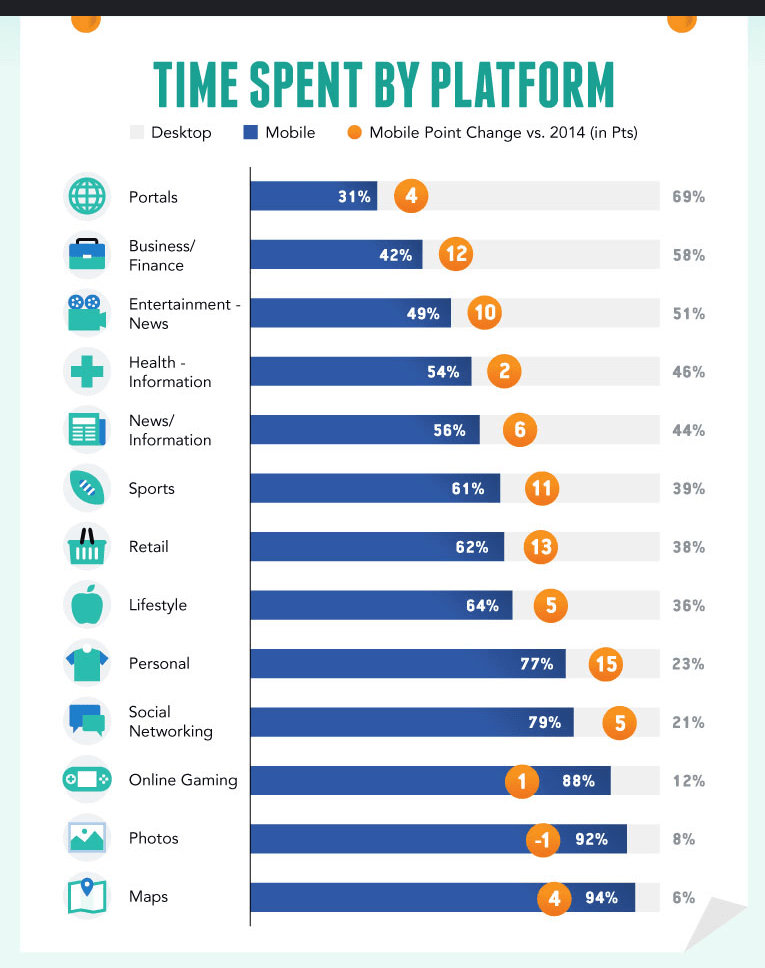This is a guest post by Brooke Campbell from Entrance Consulting.
2016 turned out to be an extraordinary year in the mobile industry, and that trend won’t go away in 2017. Available Business Intelligence has led many companies to realize that investing in mobile is no longer an option but a necessity. Because of this, there has been an increase in the number of companies dealing with mobile. Nowadays, mobile has become more mainstream than ever, and many businesses rely on it to boost revenue and meet customer demands.
More than just for mobile
The number of mobile apps hitting the market is overwhelming and the rate is faster compared to the number of users adopting smartphones. There are more than 2.2 million apps in Google Play, and over 2 million in Apple’s App Store. These figures are expected to increase into the foreseeable future. Based on previous trends, Gartner predicts that in 2017 there will be over 268 billion app downloads which will generate close to $77 billion.
Today, app developers have gone beyond the mobile platform to other platforms. You can easily get apps for smart TVs, smart homes, IoT-enabled devices and many others. Because of this increased usage, the app industry holds a lot of promise and opportunities for both companies and users.
So, what does the future hold for the app industry? Experts predict that there are major mobile app development trends which we should expect to see through 2017. Some of these include:
Increasing popularity of android instant apps
Google has recently introduced Android instant apps, which are similar to progressive web apps. These apps, like their name suggests, deliver specific services; that is, they enable Android apps to run without downloading. Users are not required to download or install these apps in the devices, and this enables the users to access a wider range of apps devoid of the usual hassle.
For instance, anyone with the link to the app can open it instantly with a single tap. This allows the user to access a particular feature in the app without having to install the entire app on their mobile devices.
Mobile users should expect more of these apps, which many industry watchers say will revolutionize the entire app industry. These apps are, however, in a preview, and they have only a few advanced features missing. The apps are also in their early stages and can be accessed by Android users.
Increasing popularity of progressive web apps
Progressive web apps are used to run user interfaces in web browsers. There is increased attention towards these apps because of their ease of development and the almost instant satisfaction for the app’s user experience.
Researchers say that a mobile app loses 20% of its users for each step you make them take toward using it.
These apps have been gaining popularity because of the increased adoption by mobile users. The apps are developed with progressive enhancement as a core principle, thus making them easier for practically every user regardless of the browser they choose to use.
Progressive web apps are primarily designed for mobile users who have unstable or poor data connections. The apps will significantly help users who visit websites using their mobile phones before even checking if the app is available in app stores. The progressive web application will capitalize on this, thus leading to improved user retention without the challenges involved in maintaining mobile apps.
Prioritizing security of mobile apps
Smartphone security is now more critical than ever because of the amount of personal information these devices hold. Surprisingly, a lot of smartphone users don’t take the security of their data very seriously, and this has become a great concern for app developers. Consequently, app developers have begun designing applications with inbuilt security features, which will have a very large impact in the mobile app industry.
iOS coding is now being moved to Apple’s own programming language, Swift, from the current Objective C. Other developers have also started to use this platform, as it provides a better user interface with stronger security features. With more developers adopting this new programming language, mobile users should start expecting more secure apps in the market.
The rise of beacons and location-based technology
There has been a continuous advancement of location-based beacon technology in the past two years. If expert predictions are anything to go by, this advancement will not slow down this year, especially in retail and healthcare industries. Predictions by Juniper Research show that location-based services will generate $43.3 billion by 2019.
Beacons allow retailers to link the gap between the in-store and online experience. Their primary role is to collect valuable in-store data, traditional in-store metrics like footfall and location-based push notifications. Beacons also promote personalization, a feature that perhaps explains why they have gained traction as the engagement tool to improve the overall customer satisfaction.
The rise of virtual reality and augmented reality
This is one of the most important trends to watch out for in 2017. Augmented reality is set to continue rising after the successful release of Pokémon GO in 2016. This game has dominated the App Store for a while, and it has proved that augmented reality has the capability to influence smartphone users in more meaningful ways. AR apps are considered to be promotional; however, more and more apps have started integrating AR into their utility.
Virtual reality and augmented reality, on the other hand, are expected to hit the $150 billion mark in revenue by 2020. Virtual technology has come a long way regarding its accessibility and performance. Many companies launched their VR headsets a year after the introduction of VR, and this pushed the technology to mainstream adoption.
In 2016, VR hardware faced stiff competition from companies like Facebook, HTC, Samsung and Sony amongst others. However, in the midst of all these manufacturers and the competition, the VR is finally ready to hit the market and has already attracted the attention of consumers and the media too. We should start to expect a huge focus now on experimental features after the successful release of the hardware by 2018.
Author Bio:
Brooke loves surfing through social media, so she made it a full time job and works as a social media manager at a Software Consulting firm. And loves all things Tech. When not working, she eats and sleeps, in that order.

